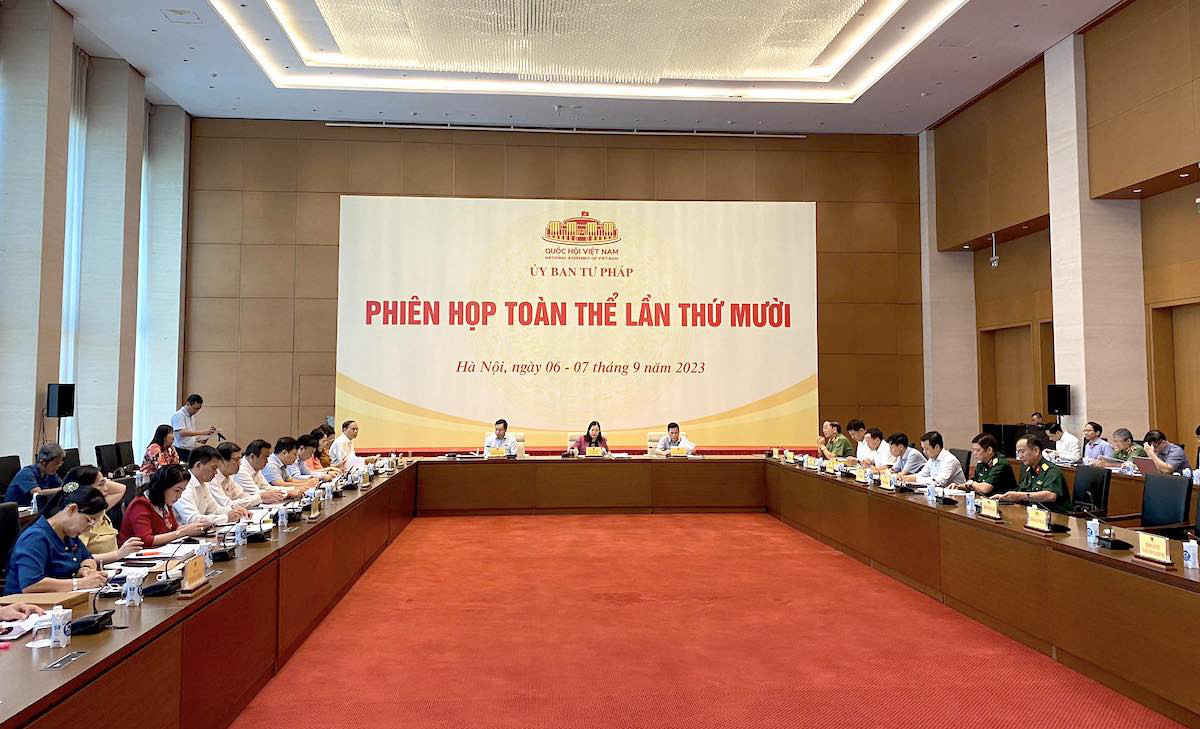According to the Government's report, 54 officials have been disciplined for dishonesty in declaring assets, income and explaining the origin of additional assets.

View of the plenary session of the Judiciary Committee
On the morning of September 6, the Judiciary Committee held a plenary session to review reports on judicial work and anti-corruption in 2023.
Previously, the Government reported on anti-corruption work in 2023 to the National Assembly Standing Committee.
The Government emphasized that the work of preventing corruption and negativity continues to be promoted, with new steps forward, more drastic, synchronous, comprehensive and effective, leaving a good impression and further strengthening people's trust.
Corruption prevention solutions have been promoted, regularly reviewed, and adjusted to suit reality; many preventive measures have been effective.
Specifically, publicity, transparency and accountability in the organization and operation of agencies and units, especially in areas prone to negativity and corruption, have had positive changes.
Ministries, branches and localities inspected 11,056 agencies, organizations and units on publicity and transparency (an increase of 33.2% compared to 2022), discovering 77 agencies, organizations and units in violation.
6,374 inspections of the implementation of norms, standards and regimes have been conducted by ministries, branches and localities.
Thereby, 300 cases and 439 violators were detected (an increase of 28% in the number of cases and 38.1% in the number of violators compared to 2022); 129 people were administratively handled; 2 people were transferred for criminal prosecution; and 45.2 billion VND was recommended to be recovered.
The work of inspecting and supervising the organization and implementation of the code of conduct of cadres, civil servants and public employees in the performance of duties, public service and in social relations is given attention and focus.
According to the report, ministries, branches and localities have inspected the implementation of the code of conduct for officials and civil servants at 7,651 agencies, organizations and units; promptly detected and corrected violations and handled 893 officials, civil servants and public employees.
The number of cases of officials violating the code of conduct and professional ethics increased by 71.5% compared to the previous year.
Notably, in 2023, there were 23 cases of returning gifts to the unit, with the amount of 93 million VND. Of which, 19 people were from the State Bank, 1 person from Ho Chi Minh City, and 3 people from Da Nang.
The Government said that all levels and sectors have transferred 37,474 cadres, civil servants and public employees to different positions to prevent corruption (an increase of 86.4% compared to 2022).
The issue of controlling assets and income of people in positions of power and authority is implemented actively and seriously.
According to data, by the end of 2022, 60,458 people had declared their assets and income for the first time; 545,535 people had declared their assets and annual income; 44,015 people had made additional declarations; 161,928 people had declared their assets and income for personnel work; 655,299 people had their asset and income declarations made public.
From February 8, 2022 to April 30, 2023, competent authorities verified the assets and income of 13,093 people; 2,664 people had errors in declaring on the wrong form, not following instructions, incomplete information, late compared to regulations...
In particular, the agencies have handled 54 people for being dishonest in declaring assets, income and explaining the origin of additional assets (removing names from the candidate list; disciplining by warning; disciplining by dismissal...).
The Government affirmed that in 2023, it will resolutely clarify and assign political responsibility to leaders who allow violations and shortcomings to occur in the assigned management and responsibility areas.
According to reports from ministries, branches, localities, and related agencies, organizations, and units, 39 leaders and deputy leaders were found to be irresponsible for allowing corruption to occur (an increase of 105.2% compared to 2022).
Specifically, 11 leaders and deputy leaders were criminally prosecuted for lack of responsibility for allowing corruption to occur.
28 leaders and deputy leaders were disciplined for lack of responsibility for corruption (of which 3 were reprimanded, 12 were warned and 13 were dismissed).
Handling the responsibility of the head has had a deterrent effect, enhancing the role and responsibility of the head in preventing corruption at the agency and unit in charge.
According to Tuoi Tre